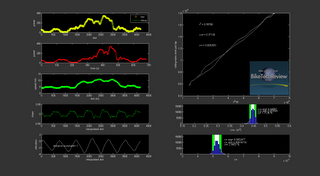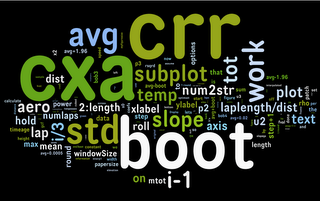Power Meter Field Testing - WLB Method
Over the past few months, I've been slowly generating data on a variety of field test venues with my SRM power meter.
Any of the variety of field testing methods out there can produce a number. The thing that has always made me curious about those #'s that are generated is "how reliable are they".
The best I've been able to do with the various field testing I've done is +/- several percent on aero props and Crr props using a tedious regression technique that takes about 45 minutes to generate data on a couple setups.
I spent some time and whipped up a script that incorporated a suggestion (thanks Adam!) - where one uses the work per lap of a loop course to generate estimates for cxa and crr -> more discussion here:
http://forum.biketechreview.com/viewtopic.php?f=1&t=2307
the last step for me was to use these estimates and assume that cxa doesn't change over the laps (reasonable!) and calculate the crr on a per lap basis. If one did 6 laps, they'd have 6 independent estimates of crr assuming a consant cxa generated from Adam's work per lap regression method. Similarly, one can use constant crr values across laps to come up with 6 independent cxa estimates (1 per lap).
We can then bootstrap these data sets to get an idea about how reliable the final estimates for cxa and crr are.
Here's a sample plot that shows the output from one of my field tests:

pretty crafty, I reckon -> Adam is a pretty smart dood to figure that one out!
So, yeah, I reckon I'll call this compilation of data reduction techniques the "WLB" method -> y'know, Work per Lap Bootstrap... d'oh!
Here's the wordle version of the data reduction script:

holy cow, that's pretty nerdy, huh!?
Any of the variety of field testing methods out there can produce a number. The thing that has always made me curious about those #'s that are generated is "how reliable are they".
The best I've been able to do with the various field testing I've done is +/- several percent on aero props and Crr props using a tedious regression technique that takes about 45 minutes to generate data on a couple setups.
I spent some time and whipped up a script that incorporated a suggestion (thanks Adam!) - where one uses the work per lap of a loop course to generate estimates for cxa and crr -> more discussion here:
http://forum.biketechreview.com/viewtopic.php?f=1&t=2307
the last step for me was to use these estimates and assume that cxa doesn't change over the laps (reasonable!) and calculate the crr on a per lap basis. If one did 6 laps, they'd have 6 independent estimates of crr assuming a consant cxa generated from Adam's work per lap regression method. Similarly, one can use constant crr values across laps to come up with 6 independent cxa estimates (1 per lap).
We can then bootstrap these data sets to get an idea about how reliable the final estimates for cxa and crr are.
Here's a sample plot that shows the output from one of my field tests:

pretty crafty, I reckon -> Adam is a pretty smart dood to figure that one out!
So, yeah, I reckon I'll call this compilation of data reduction techniques the "WLB" method -> y'know, Work per Lap Bootstrap... d'oh!
Here's the wordle version of the data reduction script:

holy cow, that's pretty nerdy, huh!?
Labels: Crr, CxA, powermeter, Statistics


